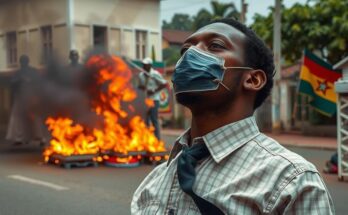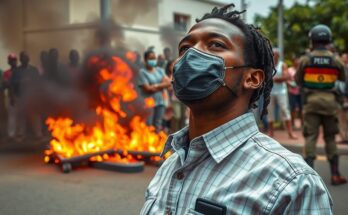The article examines America’s Cold War interventions across the globe, particularly highlighting their violent and lasting impact in countries such as Indonesia and Brazil. It discusses the resurgence of Cold War-era ideologies in contemporary politics, illustrated by recent events and political figures, and analyzes Vincent Bevins’ “The Jakarta Method” as a key text that elucidates the historical and ongoing consequences of these interventions. Through personal narratives and historical accounts, the article articulates the traumatic legacy that continues to shape geopolitical dynamics today.
During the 20th century, the United States engaged in numerous violent interventions across the globe, targeting states such as Indonesia and Brazil in a purported effort to curb the spread of leftist ideologies. These treacherous actions cast a long shadow over contemporary geopolitics. Recent instances, such as the alarming shooting at the Cuban embassy in Washington, D.C., further illustrate this legacy, underscoring the deep-seated ideological divides that permeate American society. The rise of figures like Brazil’s Minister of Culture, who downplays the horrors of military dictatorship, signals a troubling trend reminiscent of the Cold War’s fervent anti-communism. Vincent Bevins’ compelling investigation in “The Jakarta Method” casts light on the catastrophic repercussions of U.S. involvement in Indonesia, characterized by mass killings and widespread trauma. He asserts that the violent campaign against communism in Indonesia not only scarred its populace but also established a paradigm for subsequent U.S. interventions in Latin America. The horrific purges of leftist elements in Indonesia during the late 1960s, instigated by the U.S.-supported military coup against President Sukarno, exemplify this brutal approach and bolstered the aggressive stance against socialism in the broader Third World. Bevins’ narrative is enriched through personal accounts, such as that of Francisca Pattipilohy, whose family faced colonial violence and whose dreams of democratic governance were shattered by U.S. tactical support of anticommunist regimes. The book chronicles the dark legacy of these operations, revealing how expressions of leftism remain criminalized in Indonesia and how such historical legacies foster a climate conducive to a revanchist mentality in nations like Brazil under President Bolsonaro. The legacy of U.S. Cold War interventions not only achieved immediate political objectives but also facilitated a sustained ideological war against any form of governance deemed too sympathetic to social democracy. The long-term ramifications are evident in the persistent violence and suppression of dissent that continues to plague these regions today.
The United States’ involvement in global conflicts during the Cold War period was marked by a ruthless strategy aimed at curbing the spread of leftist ideologies. The interventions in countries like Indonesia and Brazil were part of a broader agenda to maintain capitalist hegemony, often resulting in significant human rights abuses. In “The Jakarta Method,” journalist Vincent Bevins delves into the historical context of these interventions, explaining how U.S. policies were instrumental in fostering violence and instability, which continue to resonate in contemporary politics. The book highlights the interplay between ideologies and U.S. foreign policy in shaping the world, particularly in nations that sought alternative paths to governance.
In summation, America’s Cold War interventions have left an indelible mark on global politics, particularly in countries such as Indonesia and Brazil. Bevins’ “The Jakarta Method” meticulously illustrates the historical legacy and ongoing repercussions of these actions, revealing how they fostered environments of violence, repression, and ideological fervor. The findings suggest that the trauma inflicted by these interventions continues to influence political landscapes and populist movements today, raising critical questions about the ethical dimensions of U.S. foreign policy and its long-term impacts on sovereignty and human rights across the globe.
Original Source: jacobin.com




